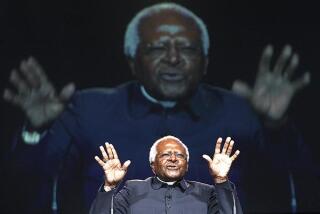Incoming Nigerian leader prefers a simple lifestyle
- Share via
ABUJA, NIGERIA — Africa’s next Big Man likes to pray on the ground under the same tree outside the same local mosque where he has knelt for some 15 years. And as governor of Katsina state in northern Nigeria, he has generally driven himself around in a simple car.
Umaru Yar’Adua is pious, taciturn, and humble, a man of ascetic tastes. Now, he is about to become one of Africa’s most powerful men: president of oil-rich Nigeria, a vast nation of 135 million people with huge geopolitical clout.
But Yar’Adua, who is to succeed the flamboyant President Olusegun Obasanjo, maintains that he has no intention of abandoning his simple way of life.
“I just adhere to an ordinary lifestyle,” he told The Times in a recent interview with several Western journalists. “I go to the mosque and I pray as an ordinary person would pray because I don’t want to have problems when I leave office.
“The less you allow power to get to you, the more you are able to adjust when leaving office,” he said in a tone as solemn and measured as a school headmaster.
Yar’Adua, who won an April vote marred by widespread accusations of ballot fraud, may be immune to the rapacious taste for luxury common in a country where officials tend to see stealing public money as a perk of office. Even critics do not question his financial integrity.
But it remains to be seen whether his uncharismatic, low-key style will prove a good fit.
For one thing, Yar’Adua, who is with Obasanjo’s People’s Democratic Party, has kept such a low profile that many still have no idea what he stands for.
In addition, his collapse at a campaign rally in March has raised questions about his health. And some take his low-key personality as a sign of weakness, with media speculation he will turn out to be a puppet for Obasanjo, who wanted a third term, but was blocked by the Senate.
Several analysts also question whether Yar’Adua, 56, can win the respect of the military in a nation that was ruled by generals less than a decade ago. They also raise doubts on whether he is tough enough to dominate the competing elites and opportunists who will swirl obsequiously about him in coming months.
Eight years of elections and civilian rule have not seen a decisive break with the corruption of the past, when military rulers looted state finances and squandered billions in oil wealth, ignoring the needs of the poor.
Yar’Adua’s ability to crawl out from under Obasanjo’s huge shadow will be the first sign of whether he can impose an era of reform and transparency on this sprawling, divided nation, with its decaying infrastructure, poor government services, frequent bouts of sectarian violence and discredited democracy.
Wearing a flowing pale blue robe and traditional hat, he recently told reporters that he would be up to the task.
“I cherish honesty, hard work, accountability and transparency,” said Yar’Adua, who holds a master’s degree in analytical chemistry, the first university-educated leader here since 1975. “I cherish my liberty and freedom. I recognize that others have the right to a view, even if it’s different to my view.”
Yar’Adua is one of five current state governors not accused of corruption or financial misdeeds, and one of the few to have published a list of his assets -- modest by the standards of Nigeria’s ruling class.
His administration claims to have left Katsina state with a $50-million surplus after inheriting debts in 1999. Yar’Adua’s administration also spent more on schools and social infrastructure than many other states.
In late April, he defeated two main rivals in a presidential election condemned by Western and local observers, a controversy likely to dog Yar’Adua’s first months and slow his momentum, said Nnamdi Obasi, an analyst for the International Crisis Group based in Abuja, the national capital.
“People talk of him as the recipient of stolen goods. It’s going to undercut the legitimacy of his government,” Obasi said. “They [members of the ruling party] are doing their best to paper over it, but this is going to stay around for some time.”
Yar’Adua’s father, Musa Yar’Adua, was minister for Lagos in the first government after independence in 1960, and his older brother, Gen. Shehu Yar’Adua, was deputy to Obasanjo when the president was military ruler in the late 1970s. Obasanjo and Yar’Adua’s brother were jailed in the mid-1990s after pressuring military dictator Gen. Sani Abacha to move to civilian rule. Shehu Yar’Adua died in jail and Obasanjo was released after Abacha’s death in 1998.
Some believe Obasanjo’s loyalty and sense of debt to Shehu Yar’Adua influenced him to pluck Umaru Yar’Adua out of obscurity as the ruling party’s presidential candidate.
But Obasanjo might be disappointed if he thinks he can rule by proxy through Yar’Adua, said Patrick Smith, editor of the analytical journal Africa Confidential.
“Perhaps Obasanjo thinks he’s going to do it. But if [Yar’Adua’s] presidency gains momentum, and he gets things done and builds up a popular base for himself, then it becomes extremely difficult,” Smith said.
Yar’Adua has a reputation among his backers as “an extremely hard guy,” he said. “He doesn’t make his intentions known beforehand, but when he makes up his mind, he does something.”
Yar’Adua is a serious person who is “extremely brilliant,” said former fellow college student Lawal Balarabe, now an actuary.
At school, he showed “a capacity to organize people around a common cause,” Balarabe said.
The biggest question, said Smith, was whether Yar’Adua can dominate Nigeria’s competing interests and elites.
“Even if he has the best will in the world, it’s going to be a difficult time in the next six months,” Smith said, “and there are going to be a lot of opportunists in the political and military classes who will want to take advantage of that.”
Journalist Mahmud Jega said that in the 1990s, Yar’Adua was a tireless grass-roots campaigner, who once visited every village in one part of his state in a 72-hour nonstop marathon. In the middle of the final night, with one tiny village remaining, aides begged him to stop, but he left them behind and pressed on alone.
“He’s a very strong-willed person. And 16 or 17 years ago he was an extremely dynamic fellow. But honestly I don’t think he is so dynamic now, most probably for health reasons,” Jega said, citing a kidney ailment that plagued Yar’Adua in 2000.
In March, Yar’Adua was flown to Germany for medical tests after collapsing at a campaign rally, but he brushes aside questions about his health.
He has promised to finalize plans to renew the power sector and stabilize longtime strife in the oil-producing Niger Delta within his first 100 days in office.
Yar’Adua declares the era of the wealthy ruling elite dead and has said that being president will be just like any other Nigerian job.
“This office is just a responsibility. It’s routine work. When people talk about power, I don’t see where the power lies. If you are honest with yourself, the power lies with the law.”
As a student, said Balarabe, Yar’Adua frequently discussed poverty, even though he came from a wealthy family. Yar’Adua said that as governor, he regularly meets poor families.
“I go to the villages, interacting with poor people. When things happen to them, I go to their houses to commiserate with them. I intend to find the time to continue to do this whenever I can,” he said
That kind of rhetoric marks a big change from the past. But analyst Obasi said that though Yar’Adua was saying many of the right things, “when you look at the hard facts, they’re not very cheering.
“Power can produce surprises. We’re hoping that Yar’Adua will be that surprise. But really it’s more of a hope than an expectation.”
*
More to Read
Sign up for Essential California
The most important California stories and recommendations in your inbox every morning.
You may occasionally receive promotional content from the Los Angeles Times.












